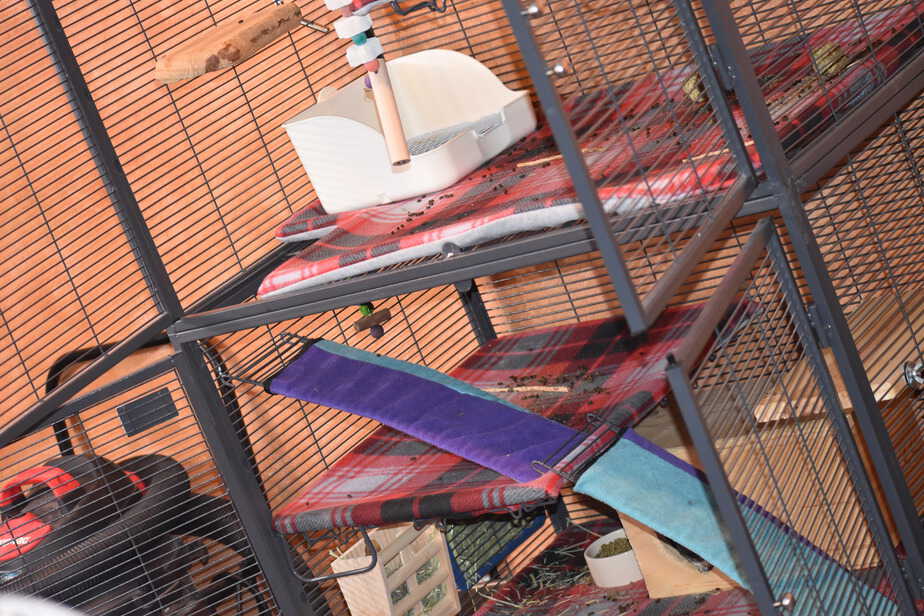
That means they fall under exotic pet laws in many states.
However, there is obviously a big difference between a chinchilla and a venomous snake.
But both species of chinchilla are endangered in the wild.
What does that mean for us? Are chinchillas legal in California, or is it illegal to own one as a pet?
And if they are legal, are there any restrictions on their ownership?
Keep reading to find out. We are going to cover everything you need to know about owning pet chinchillas in the state of California.
Contents
Are Chinchillas Legal In California?
Chinchillas are legal in California. You are allowed to keep them as pets, as long as you keep them in a habitat that meets certain requirements specified by the state.
Your chinchilla must have sufficient space to move around, access to food and water, and should not be exposed to extreme temperatures or weather conditions.

Let’s take a closer look at exactly what is involved in providing the conditions required for chinchilla ownership under California state law.
California Laws For Chinchillas
As mentioned, it is legal for a person to own a chinchilla in California. But there are certain state laws you need to abide by to make sure your chinchilla is well looked after.
It is illegal to buy or sell a chinchilla from an unlicensed breeder or dealer. You should check the licenses of any breeder before you purchase your chinchilla. You can also adopt chinchillas from pet rescue centres, which is a great way to give an animal in need a new home.
You also need to ensure that you provide ample space and exercise opportunities for your chinchilla, as well as access to water and food.
I suggest feeding your chinchilla commercial food pellets twice a day and making sure it has a steady supply of hay in its feeder, so it can snack whenever it feels like it. You should also make sure the water bottle is always filled with a constant supply of fresh water.
You must not expose your chinchillas to extreme weather conditions or temperatures. Their natural habitat is in the Andes mountains, where the climate is cool (but not cold) and arid. You should provide similar conditions in your home.
This means you should keep the room where your chinchilla lives at a comfortable 60° to 74° Fahrenheit (16° to 23° Celcius). You should also keep the humidity between 40% and 60%. This article has more on the ideal temperature and humidity for a chinchilla.
Keeping Your Chinchilla Comfortable

One of the most important ways to keep your chinchilla comfortable is to give it a balanced and nutritious diet. You should feed it a combination of hay and specially formulated chinchilla pellets. It should also have access to fresh water at all times.
You can supplement that with occasional treats, but they should make up a small portion of your pet’s diet. Fruits and vegetables are fine in very small amounts, but there are better treats for chinchillas. Fruits and vegetables contain too much water and sugar.
Good treat options are dry things with no added sugar. Plain cereals like Corn Flakes or shredded wheat are good, as certain are dried flowers. Oats and rose hips make great treat options, too.
Make sure to avoid sugary treats like candy and especially chocolate, which is actually toxic for chinchillas. Luckily, this means keeping more chocolate to yourself!
Hygiene is also important when it comes to caring for your chinchilla. To keep your chinchilla clean, you should give it a dust bath on a regular basis. Two to three times a week is good.
For this, you use special chinchilla dust, which is available at most pet stores and online. You should give your chinchilla 10 to 15 minutes to roll around in the dust, to help remove excess oils from its coat.
This is the only way to wash a chinchilla. You should never use water, since their dense fur stays damp forever, which can lead to health issues. Besides, dust baths are fun for us to watch and even more fun for your little fluff-ball. Seriously, they absolutely love them!
You should also make sure you pet has plenty of space to run around in their cage. Exercise is important for your chinchilla to keep it fit and healthy and reduce any pent-up stress.
What Pets Are Illegal In California?
In California, certain pet species are illegal to own. These animals include gerbils, squirrels, hedgehogs, monkeys and ferrets. This is due to their potential for causing harm to humans or other wildlife in the area.
Even though a chinchilla is similar to gerbils and squirrels, they are allowed as pets in the state of California, because they have been deemed more robust and sturdier and they do not have a negative effect on native species.
What Exotic Pets Are Legal In California?

In California, a variety of exotic pets are legal to own. These animals include lynxes, tarantulas, miniature horses, ball pythons and pygmy goats.
Many of these animals have been domesticated or bred for use as companion animals. They will usually need special diets and care but can become great pets if you care for them correctly. They can have lasting emotional benefits for an owner by giving them a sense of responsibility and importance that comes with caring for another living being.
Are Chinchillas Illegal In California: Final Thoughts
It is legal to own chinchillas as pet in the state of California. However, you do need to make sure that you provide your pet the proper living conditions.
This means setting up a habitat that is spacious and comfortable and keeping your chinchilla in a room with the correct temperature and humidity., You also need to keep the habitat clean and ensure your pet gets plenty of food and water.
If you are in a different state, we have another article on the legality of chinchilla ownership in every state. We also have one specifically on whether it is legal to own a chinchilla in Washington. finally, we have an article on whether it is illegal to own chinchillas in Australia, for all our readers down under.
Leave a Reply